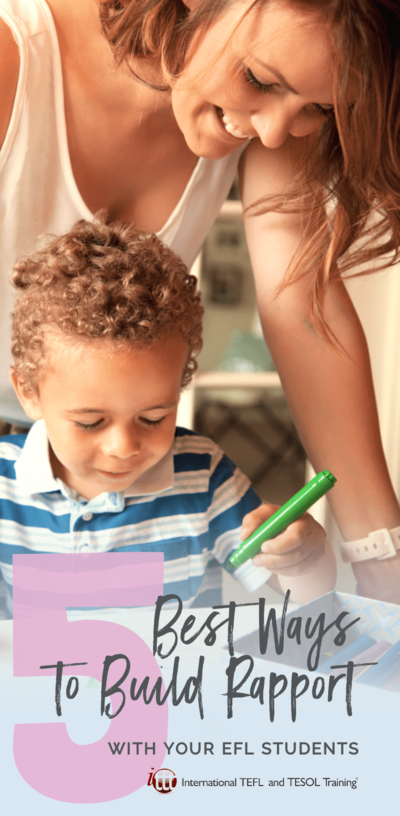The 5 Best Ways to Build Rapport With Your TEFL Students

Having a good relationship with your students has many benefits as a teacher. They will become more interested in your lesson, they will learn a lot more and it creates an overall comfortable classroom environment for both the teacher and the students. However, it's often easier said than done to build rapport with those in your class. So how do you do it? This article highlights the 5 best ways to build rapport with your TEFL students.
Table of Contents
1. Learn the Names of Your Students
2. Be Energetic and Enjoy Yourself
3. Be Patient but Set Boundaries
4. Learn Something About Your Students' Personal Lives
5. Share Some Things About Your Own Personal Life
Are you ready to teach English abroad?
Our TEFL certification courses also teach you useful techniques and methods to further build rapport for your students.
1. Learn the Names of Your Students
We've all had that teacher or professor who doesn't bother learning our name and just goes around calling everyone "you". Did you enjoy taking their class? Probably not so much. Addressing your students with their name shows that you care and it can take down awkward walls. For new teachers it can take some time to learn all the names of your students, but the longer you teach the easier it becomes. Also make sure to ask for the correct pronunciation, especially when teaching English abroad and your students don't have English names. You don't want to teach for a year and find out you've been saying a student's name all wrong.
Also read: Who will my students be when teaching English abroad?

2. Be Energetic and Enjoy Yourself
You've probably been through some terribly boring lessons led by teachers who seem to be falling asleep listening to their own monotone voice. Again - not so fun and very annoying as a student. As an ESL teacher, you want to stay energetic and look like you enjoy what you are doing - even if you sometimes don't. Never let your bad mood affect your classes. Energetic teachers affect their students in a positive way, making them excited to be there and keen to learn. When you as the teacher enjoy yourself when teaching and share a laugh every once in a while, you can build a great relationship with your students.
3. Be Patient but Set Boundaries
Being short-tempered really won't get you far in the field of teaching. Especially when dealing with non-native English learners, you need to be patient and careful what you say. Keep your voice clear, use proper grammar, speak at a pace appropriate to the level of your students and be patient when it comes to things like the students' pronunciation and grammar. This shows your students that you respect them and also that you care and recognize their needs. At the same time, however, don't let your students take over control of the classroom. When students misbehave, set clear boundaries and keep to the rules. This shows students that everyone is equal and that you work hard to create a peaceful and fair learning environment for everyone, which they will immensely appreciate and respect.
Check out our 50-hour specialized TEFL course in teaching English to young learners!

4. Learn Something About Your Students' Personal Lives
This is definitely something that doesn't happen after just one class, but you should definitely try to learn something about your students and remember it. You can ask about their family, home, favorite food or color, and use this information during your class for example sentences or references when teaching. It's also a helpful icebreaker activity to ask students what they did on the weekend or during their vacation or similar. You get them to talk in English and get to know them at the same time. When your students see that you are interested in them and that you remember something about their lives, they feel respected and important to you. This results in your students enjoying their classes with you and making a mutual effort in learning and paying attention to what you say.
5. Share Some Things About Your Own Personal Life
Just like your students sharing something about their lives with you, you should do the same as appropriate. Usually, when teaching English in a foreign country, your students will be eager to learn about you and your background and will want to understand cultural differences. At the same time, when you share some personal stories and things about yourself, they see that you trust them. In return, they trust you back and are more inclined to pay attention in class and to stick to the rules.

Listen to this blog post
Are you ready to teach English abroad?
Building rapport is all about creating a comfortable and fun learning environment for your students. You want your students to feel safe and interested when in your class and having a good relationship with them is the most effective tool for successful classroom management.
Apply now & get certified to teach english abroad!
Speak with an ITTT advisor today to put together your personal plan for teaching English abroad.
Send us an email or call us toll-free at 1-800-490-0531 to speak with an ITTT advisor today.
Related Articles
- Top TEFL Countries That Hire Teachers in Advance
- Top 8 Resources For Researching Teaching English Abroad
- The 10 Best Destinations for Teaching English Abroad in 2018
- Why You Should Take Specialized TEFL Courses
- Where to Earn the Highest Salaries Teaching English Abroad
- The Top Hiring Seasons for Teaching English Abroad




